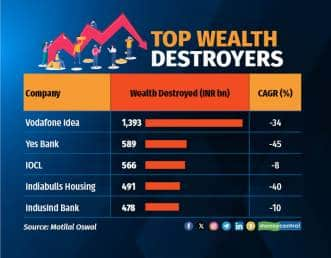The report noted that while the financial sector was the biggest wealth destroyer, the sector also contributed a sizable chunk to wealth creation.
Vodafone Idea has emerged as the biggest wealth destroyer over the past five years, according to Motilal Oswal’s Wealth Creation Study for the years 2018-2023. The embattled telecom operator wiped off Rs 1.34 lakh crore in wealth over the past five years.
The next largest wealth destroyers were Yes Bank, IOCL, Indiabulls Housing, and IndusInd Bank.

Bandhan Bank, Coal India, New India Assurance, General Insurance and Indus Towers were among the top ten wealth destroyers.
Cumulatively, these companies wiped out Rs 5.6 lakh crore, a staggering 33 percent of the entire Rs 17-lakh-crore pie that was recorded during the period under study.
The report noted that the financial sector was the biggest wealth destroyer. (Interestingly, the sector also accounted for a sizeable chunk of wealth creation.) The financial sector contributed 29 percent to the total wealth destroyed, while telecom, oil and gas, and consumer and retail were the largest destroyers.
The total Rs 17 lakh crore of wealth destroyed was 25 percent of the wealth created by the top 100 companies.
Why the counters fared poorly
Vodafone Idea was facing financial challenges and accumulated dues related to adjusted gross revenue (AGR). The AGR issue arose from a legal dispute between telecom operators and the Department of Telecommunications (DoT) regarding the calculation of AGR, on which licence fees and spectrum usage charges are based.
The Supreme Court had ruled in favour of the DoT's definition of AGR. This ruling resulted in significant financial liabilities for Vodafone Idea, and the company struggled to pay the dues along with the interest fees. The situation raised concerns about the sustainability of the company's operations.
Earlier this year, the government stepped in to rescue Vi, as it is branded, from its Rs 2-lakh-crore debt, converting Rs 16,133 crore of interest dues into equity.
While Vi was saved from collapse, it caused investors to lose Rs 1.34 lakh crore as its stock tumbled. Over the past five years, the counter has fallen 39.90 percent from around Rs 50 in 2018 to Rs 13.95 as at the close on December 14. The company notched deep losses, but has trimmed losses from April 2023 onwards.
Yes Bank, brought back from the brink of collapse by a buy-in by a State Bank of India (SBI)-led consortium, has erased Rs 58,900 crore from its market capitalisation. The lender had high levels of non-performing assets, and the Reserve Bank of India (RBI) was forced to take corrective measures.
In 2020, the RBI imposed a moratorium on Yes Bank, restricting withdrawals and superseding its board. The government and RBI chalked out a rescue plan under which SBI, along with a bunch of other lenders, shored up Yes Bank’s capital to the minimum regulatory levels by infusing Rs 10,000 crore, and the lender under its new management began to fix its balance sheet in earnest.
However, the stock has not recovered to anywhere near its 2018 highs. Over the past five years, the stock has fallen a huge 88.33 percent, from around Rs 260 in mid-2018 to Rs 21.40 as of close on December 14.
Indiabulls Housing Finance has been in the limelight since 2019 onwards, when the company was accused of siphoning investors' funds. On investigating, the Ministry of Corporate Affairs found the claims had no basis. However, the company’s revenues have been steadily declining since then, with the bottom line taking a hit as well. Since 2018, its shares have fallen 73.76 percent from around Rs 820 apiece to Rs 217 in 2023.
IndusInd Bank was under scrutiny in 2021 as its microfinance subsidiary, Bharat Financial Inclusion, was accused of evergreening loans in 80,000 accounts. From highs in 2018 of around Rs 2000, shares of IndusInd Bank nosedived over 80 percent in 2020. However, the scrip has steadily been clawing back gains, and over a five-year period, is down 1.5 percent, near Rs 1,558.45 apiece. Over the past year, it has risen 25.2 percent.
Disclaimer: The views and investment tips expressed by investment experts on Moneycontrol.com are their own and not those of the website or its management. Moneycontrol.com advises users to check with certified experts before taking any investment decisions.


No comments:
Post a Comment